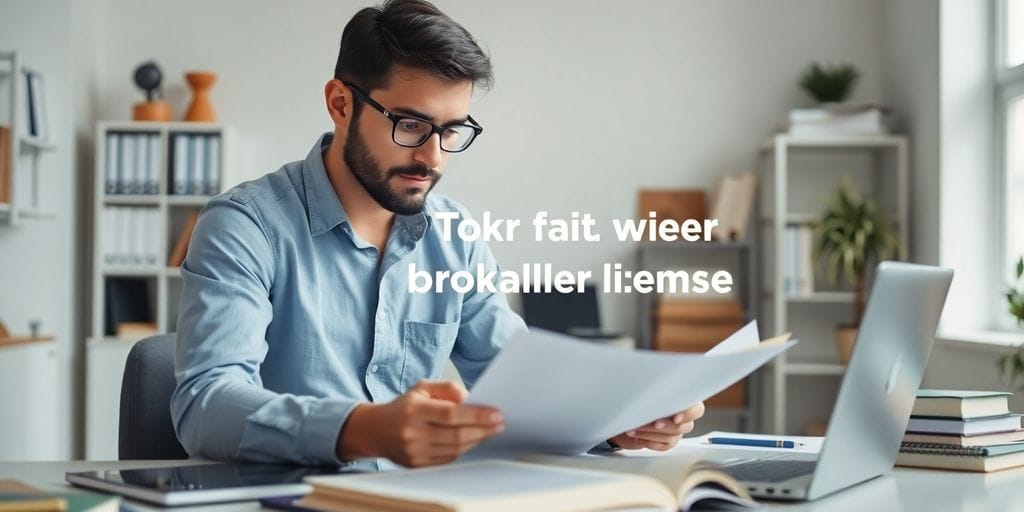Getting your broker license is a big step in the real estate world. It opens up new career opportunities and allows you to take your real estate career to the next level. However, the process can feel overwhelming if you don’t know where to start. In this article, we’ll break down the steps you need to take to obtain your broker license, share some helpful tips, and clarify common misconceptions. Whether you’re just starting out or looking to advance your career, this guide will help you navigate the path to becoming a licensed broker.
Key Takeaways
- Understand the different stages involved in obtaining a broker license, including pre-license and post-license education.
- Choose a quality educational institution that fits your learning style and career goals.
- Prepare effectively for the broker licensing exam by using study strategies and practice tests.
- Stay organized throughout your studies and connect with industry professionals to build your network.
- Remember that continuing education is essential for maintaining your license and staying current in the industry.
Understanding Real Estate Licensing Requirements
So, you want to be a real estate broker? It’s more than just showing houses; it starts with understanding the licensing stuff. Each state has its own rules, and you gotta know them. It can seem like a lot, but breaking it down makes it easier. Think of it as leveling up in a game – you need the right skills (education) and experience to unlock the next stage.
Key Stages of Broker Licensing
Getting your broker license usually involves a few steps. First, there’s the pre-license education – classes you have to take. Then, there’s the exam, which tests what you learned. After that, some states have post-license requirements, like more classes or specific training. It’s a process, but each step gets you closer. For example, in Florida, you need to meet certain standards set by the Florida Real Estate Commission (FREC). You also need to be 18 years old, have a high school diploma, and meet experience requirements. Understanding these brokerage regulations is the first step.
Importance of Pre-License Education
Think of pre-license education as your real estate boot camp. It gives you the basics you need to not mess things up. You’ll learn about real estate law, contracts, ethics, and all that fun stuff. It’s not just about passing the test; it’s about knowing what you’re doing when you’re working with clients and handling big transactions. Plus, a good school will also serve as solid professional accreditation.
- Understanding real estate principles
- Learning about legal and ethical obligations
- Preparing for the licensing exam
Navigating Post-License Requirements
Okay, you passed the exam – congrats! But sometimes, that’s not the end. Some states require you to take more classes or training after you get your license. This is to make sure you stay up-to-date on the latest laws and best practices. It might seem annoying, but it’s actually a good thing. It helps you be a better broker and protects your clients. Plus, you’ll need to stay on top of continuing education requirements to maintain your license.
Think of post-license education as ongoing training. The real estate world is always changing, so you need to keep learning to stay ahead. It’s like upgrading your skills in a video game – you need to keep leveling up to beat the harder levels.
The Role of Education in Obtaining a Broker License
Education is super important when you’re trying to get your broker license. It’s not just about memorizing facts; it’s about building a solid base for your whole career. Think of it as the foundation of a house – if it’s shaky, everything else will be too.
Choosing the Right Educational Institution
Picking the right school is a big deal. You want one that’s respected and has a good track record. Look for accreditation, which means the school meets certain standards. Also, see if they offer courses that fit your schedule and learning style. Some people do better in person, while others prefer online classes. It’s all about finding what works for you. LEAP Academy is a good example of an institution that offers accredited courses.
Comparing Pre-License and Post-License Courses
Pre-license courses are your starting point. They cover the basics – real estate law, ethics, and all that stuff. Post-license courses are more advanced and help you specialize. Here’s a quick comparison:
- Pre-License: Focuses on foundational knowledge. Pre-license education plays a pivotal role in exam preparation. It equips candidates with the necessary skills to succeed.
- Post-License: Dives into specific areas like brokerage management or investment. Post-license requirements differ from pre-license ones and focus on more advanced topics.
- Continuing Education: Keeps you up-to-date with the latest industry changes. Maintaining your broker license requires ongoing continuing education to stay updated on real estate laws and practices.
It’s easy to think that once you pass the initial exam, you’re done with education. But really, post-license education is a must to keep your license active. Plus, it helps you grow and stay competitive in the field.
Benefits of Comprehensive Broker Education
Good education does more than just help you pass the exam. It gives you the skills and confidence to succeed in the real world. You’ll learn how to handle tricky situations, negotiate deals, and manage a brokerage. Plus, it shows clients that you’re serious about your job. Investing in broker education is investing in your future.
Preparing for the Broker Licensing Exam
Alright, so you’ve put in the hours with your pre-license education, and now it’s time to face the music: the broker licensing exam. It can seem daunting, but with the right approach, you can definitely nail it. It’s all about smart studying and knowing what to expect.
Study Strategies for Success
First things first, ditch the cramming. Consistent, focused study sessions are way more effective. Break down the material into manageable chunks. I found that dedicating specific days to certain topics helped a lot. For example:
- Mondays: Property Law
- Wednesdays: Contracts
- Fridays: Finance
Also, don’t just passively read. Actively engage with the material. Try summarizing each chapter in your own words, or even better, teach it to someone else. Explaining concepts out loud really solidifies your understanding. And don’t forget to review regularly!
Utilizing Practice Exams Effectively
Practice exams are your best friend. Seriously. They’re not just about testing your knowledge; they’re about getting comfortable with the exam format and identifying your weak spots. Treat them like the real deal – timed, no distractions, the whole nine yards.
After each practice exam, don’t just look at your score. Analyze your mistakes. Why did you get those questions wrong? Was it a misunderstanding of the concept, or just a careless error? Understanding your errors is key to improving. Also, make sure you’re using a variety of practice exams. Don’t just rely on one source. The more exposure you have to different question styles, the better prepared you’ll be. You can access video content to help you prepare.
Understanding Exam Format and Content
Knowing what to expect on the exam is half the battle. Find out exactly what topics will be covered, how many questions there are, and how much time you’ll have. Most exams cover areas like property law, contracts, finance, and ethical practices.
It’s also a good idea to familiarize yourself with the question types. Are they mostly multiple-choice? Are there any simulations or case studies? The more you know about the exam format, the less anxious you’ll be on test day. And remember, time management is crucial. Practice pacing yourself during your practice exams so you don’t run out of time on the real thing.
Tips for Success in Broker Licensing

Staying Organized and Focused
One of the best things you can do is create a detailed study schedule and stick to it. It’s easy to get overwhelmed, so break down the material into smaller, manageable chunks. I found that setting daily goals helped me stay on track. Also, find a quiet study space where you won’t be disturbed. Trust me, your focus will thank you.
- Use a planner or digital calendar to schedule study sessions.
- Set realistic daily and weekly goals.
- Minimize distractions by turning off social media notifications.
It’s important to remember why you started this journey. When things get tough, remind yourself of your goals and the rewards that come with obtaining your broker license. This will help you stay motivated and focused.
Networking with Industry Professionals
Networking is super important. Attend local real estate events, join industry associations, and connect with other agents and brokers. You never know where your next opportunity might come from. Plus, it’s a great way to learn from experienced professionals and get advice. Don’t be afraid to reach out and introduce yourself. You can learn about real estate principles from them.
- Attend local real estate conferences and seminars.
- Join industry associations like the National Association of Realtors.
- Connect with other agents and brokers on LinkedIn.
Leveraging Online Resources
There are tons of online resources available to help you prepare for the broker licensing exam. Take advantage of practice exams, study guides, and online forums. Just make sure you’re using reputable sources. I found that watching videos and listening to podcasts was a great way to supplement my studying. Don’t underestimate the power of the internet!
- Utilize online practice exams to assess your knowledge.
- Explore online study guides and resources.
- Participate in online forums and discussion groups.
Here’s a quick look at some popular online resources:
| Resource | Description |
|---|---|
| Real Estate Exam Prep | Offers practice exams and study guides. |
| Realtor.org | Provides industry news, resources, and networking opportunities. |
| Local Real Estate Blogs | Shares insights on local market trends and regulations. |
The Importance of Continuing Education
Continuing education isn’t just a formality; it’s a cornerstone of a thriving real estate career. The market changes, laws evolve, and what worked yesterday might not cut it tomorrow. Staying on top of your game means committing to ongoing learning. It’s about more than just keeping your license active; it’s about providing the best possible service to your clients and building a sustainable business.
Maintaining Your Broker License
Keeping your broker license current is the most obvious reason for continuing education. States mandate a certain number of continuing education hours to ensure brokers stay informed about legal and ethical standards. Think of it as a regular check-up for your professional knowledge. It’s easy to let things slide, but failing to meet these requirements can lead to penalties, or even suspension of your license. Don’t let that happen!
Staying Updated with Industry Changes
Real estate is a dynamic field. New technologies emerge, market trends shift, and regulations are constantly updated. Continuing education helps you stay ahead of the curve. It’s not enough to rely on what you learned years ago. You need to be aware of the latest developments to effectively serve your clients. For example:
- New marketing strategies
- Changes in financing options
- Updates to fair housing laws
Staying informed isn’t just about avoiding legal trouble; it’s about providing better service. Clients expect their brokers to be knowledgeable and up-to-date. Continuing education helps you meet those expectations and build trust.
Enhancing Skills for Career Advancement
Continuing education isn’t just about maintaining the status quo; it’s about growing your skills and expanding your career opportunities. Specialized courses can help you develop expertise in niche areas, such as commercial real estate, property management, or investment properties. This can open doors to new clients and higher earning potential. Consider these options:
- Negotiation skills workshops
- Advanced marketing courses
- Real estate investment analysis
By investing in your education, you’re investing in your future. It shows clients that you’re committed to excellence and that you’re always striving to improve your broker license.
Common Misconceptions About Broker Licensing

Debunking Myths About Pre-License Education
So, you’re thinking about getting your broker license? Great! But let’s clear up some stuff first. A lot of people think the pre-license courses are just ridiculously hard and designed to trick you. That’s not really true. With the right study habits and a good course, it’s totally doable. It’s more about learning the basics you’ll actually use. Some think you can skip parts or that it’s all just common sense. Nope! You need to take it seriously. Also, don’t assume that because you’ve been in real estate for years, you already know everything. There’s always something new to learn, and the pre-license education covers important legal and ethical stuff you might not be familiar with. Think of it as building a solid base for your career. It’s better to get it right from the start. LEAP Academy offers tailored courses to help you navigate the licensing process effectively.
Clarifying Post-License Education Requirements
Okay, so you passed the exam and got your license. Awesome! But don’t think you’re done with education. Post-license education is a must. A big mistake people make is thinking it’s just a formality. It’s not! It’s there to help you grow. Another misconception? That all post-license courses are the same. They’re not. Some are way better than others, focusing on practical skills and current market trends. Choose wisely. Also, many think they can put it off forever. Nope, there are deadlines, and if you miss them, you could lose your license. Stay on top of it. Post-license education is important for career growth, helping brokers stay competitive and ready for new challenges in the Orlando real estate market.
Understanding the Role of Continuing Education
Continuing education? Yeah, it’s not just something you do to keep your license. It’s about staying relevant and sharp in a field that changes all the time. People often think it’s boring or a waste of time, but it can actually be super helpful. New laws, new technologies, new market trends – it all gets covered. Plus, it’s a chance to network with other brokers and share ideas. Don’t just go for the easiest or cheapest course. Find something that actually interests you and can help you improve your skills. Think of it as an investment in yourself and your career. The Real Estate Commission in Florida outlines specific requirements for obtaining a broker license, including completing continuing education.
It’s easy to fall into the trap of thinking that once you have your license, you’re set for life. But the real estate world is always evolving. Continuing education keeps you up-to-date and helps you provide the best possible service to your clients. Don’t underestimate its value.
The Impact of a Broker License on Your Career
Career Opportunities for Licensed Brokers
Getting your broker license can really open doors. It’s not just about having a fancier title; it’s about the opportunities that come with it. You can manage your own real estate firm, hire agents, and really take control of your career path. Think of it as leveling up in a video game – you unlock new abilities and areas to explore. Plus, you’re not stuck just selling houses; you can get into property management, investment, or even development. It’s a big step up from being a sales agent, and it shows you’re serious about the business. The exam preparation is worth it.
Building a Successful Brokerage
So, you’ve got your broker license, now what? Building a successful brokerage isn’t a walk in the park, but it’s totally doable with the right approach. Here’s a few things to keep in mind:
- Find Your Niche: Don’t try to be everything to everyone. Specialize in a certain type of property or area. This helps you stand out.
- Recruit Top Talent: Surround yourself with good agents. Offer them good commission splits and support.
- Invest in Marketing: Get your name out there. Use social media, local advertising, and good old-fashioned networking.
Building a brokerage takes time and effort. Don’t expect to become an overnight success. Stay focused, be persistent, and always put your clients first. That’s the key to long-term growth.
Long-Term Benefits of Holding a Broker License
Having a broker license isn’t just a short-term win; it’s an investment in your future. It can lead to higher earning potential, more job security, and greater control over your career. Think about it – you’re not just selling houses; you’re building a business. Plus, you’re always learning and growing, which keeps things interesting. And let’s not forget the prestige factor. Being a broker shows you’re a leader in the industry, and that can open doors to even more opportunities down the road. Don’t forget about post-license education to keep your skills sharp.
Wrapping It Up: Your Journey to Becoming a Broker
Getting your broker license is a big deal, and it takes some serious effort. But don’t let that scare you off. With the right planning and a bit of dedication, you can totally make it happen. Remember, choosing a good school like LEAP Academy can really set you up for success. Stay organized, keep your study pace steady, and don’t hesitate to ask for help when you need it. The road might be bumpy, but every step you take gets you closer to your goal. So, roll up your sleeves and get started on this exciting journey!
Frequently Asked Questions
What is the difference between pre-license and post-license education?
Pre-license education is what you take before getting your broker license, while post-license education is required after you earn your license to keep it active.
How long do I have to finish my post-license education?
You usually need to complete your post-license education within a specific time frame after getting your license, often within the first two years.
Can I take these courses online?
Yes, many schools offer online options for both pre-license and post-license courses, making it easier to fit them into your schedule.
Do I need to take more classes after I get my license?
Yes, continuing education is important to keep your license active and to stay updated on changes in the real estate industry.
Are pre-license courses too hard to pass?
Not really! With good study habits and preparation, most people find they can pass the pre-license exams.
What are the benefits of having a broker license?
Having a broker license opens up more job opportunities, allows you to run your own brokerage, and can lead to higher earnings.
Read More:










